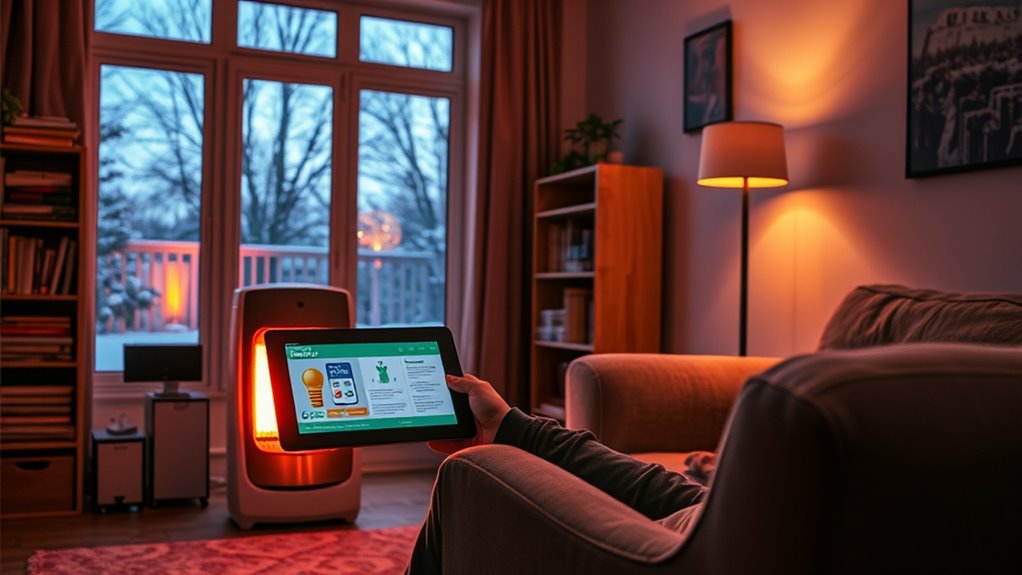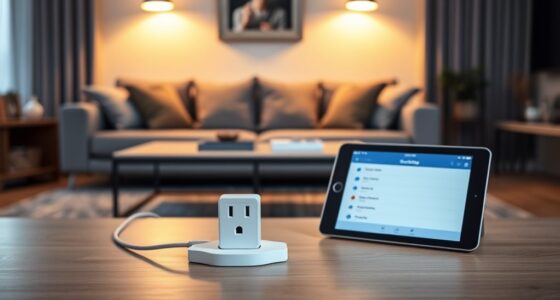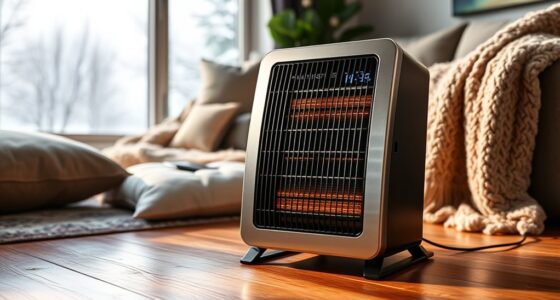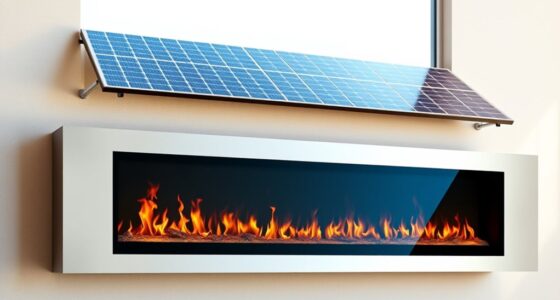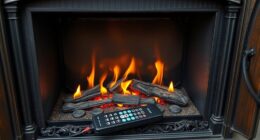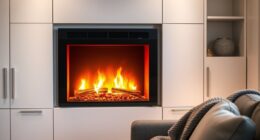Many believe space heaters always save energy and cut costs, but that’s not true. They are most efficient for small, short-term heating, not for large or long-term use. Running a heater constantly can actually raise bills and pose safety risks if not used carefully. To truly save energy and stay safe, understand how to use them properly. Keep exploring for more facts on making space heater use smarter and safer.
Key Takeaways
- Space heaters are not always cost-effective for large, long-term heating; best for small or short-term use.
- Running a space heater continuously in a large space increases energy bills and reduces efficiency.
- Safety features like automatic shut-off and proper placement are crucial to prevent fire and electrical hazards.
- Electric space heaters are generally safer than fuel-based models but still require caution and regular maintenance.
- Using a space heater alongside central heating can optimize energy use and reduce overall costs.
Energy Efficiency and Safety Considerations for Space Heaters
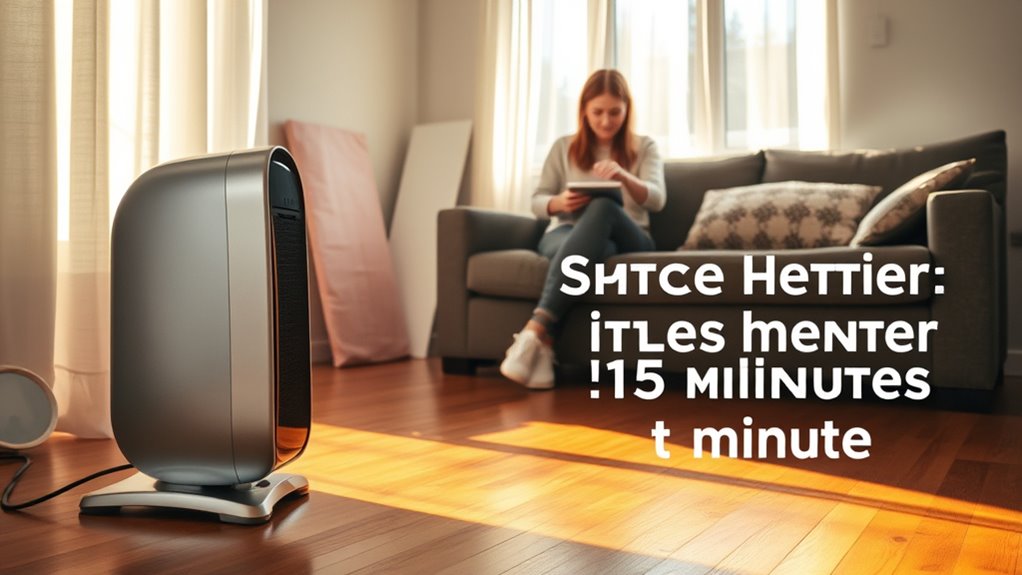
Are space heaters as energy-efficient as people believe? Many folks assume that turning on a space heater is a quick, cost-effective way to warm up a room without cranking up the central heating system. But that’s not always the case. While space heaters can offer targeted heating, their cost efficiency depends on how you use them. If you keep one running all day in a large space, your energy bills could spike, negating any savings. They’re best suited for small areas or for short-term use when you only need to heat a specific spot. When considering cost efficiency, it’s essential to compare the energy consumption of the heater with the size of the space and your overall heating needs. Using a space heater in conjunction with your main heating system might be more economical than relying on it alone, particularly if you only need to heat a small, enclosed area.
Safety concerns are another critical aspect to keep in mind. Many people underestimate the potential hazards associated with space heaters. If not used correctly, they can pose fire risks, especially if placed too close to combustible materials like curtains, furniture, or paper. Overloading outlets or using damaged cords can also lead to electrical fires. It’s vital to follow safety guidelines, such as keeping heaters on stable, flat surfaces, avoiding extension cords, and turning the unit off when unattended or sleeping. Some models come with safety features like automatic shut-off if they tip over or overheat, which can provide peace of mind, but you still need to be vigilant.
Furthermore, safety concerns extend beyond fire risks. Space heaters can cause dry air, which might lead to discomfort or respiratory issues if used excessively. In poorly ventilated spaces, they could even contribute to carbon monoxide buildup if they run on fuel or are improperly vented. Electric heaters are generally safer in this regard but still require caution. It’s important to choose the right type of heater for your space and to maintain it properly. Regularly inspecting cords and connections, keeping the heater clean, and using models with safety certifications can help mitigate risks. Additionally, understanding the energy consumption of space heaters can help you make more informed decisions about their use and safety.
Frequently Asked Questions
Do Space Heaters Increase Overall Home Energy Bills Significantly?
Space heaters can increase your overall energy bills if used inefficiently, but they don’t have to substantially raise costs if you focus on energy consumption and cost efficiency. By heating only the rooms you’re in and using thermostats wisely, you minimize energy waste. This targeted approach helps keep your energy bills manageable while maintaining comfort, making space heaters a cost-effective option when used correctly.
Are There Specific Space Heater Models That Are Safer Than Others?
Did you know that some space heater models are safer than others? You’re more likely to find safer options by checking model ratings and choosing those with advanced safety features like tip-over shutoff and overheat protection. When shopping, focus on reputable brands that prioritize safety, and always read reviews. This way, you can enjoy warmth with peace of mind, knowing your space heater is designed to keep you safe.
Can Space Heaters Be Used Effectively in Well-Insulated Homes?
Yes, you can use space heaters effectively in well-insulated homes. Their insulation effectiveness means less heat escapes, so they warm rooms efficiently. Just guarantee you choose a heater suited for your room size to maximize comfort and energy savings. Smaller spaces need lower wattage heaters, while larger rooms may require models with higher output. Proper insulation and appropriate heater selection work together for ideal, safe heating.
How Often Should Space Heaters Be Maintained for Optimal Safety?
You should perform a maintenance schedule and safety inspections on your space heater at least once a year. Regularly checking for frayed cords, dust buildup, and guaranteeing vents are clear helps prevent fire hazards. If you use the heater more frequently or notice any issues, consider more frequent inspections. Keeping up with maintenance ensures safe operation, protects your home, and extends the lifespan of your space heater.
Are There Environmental Impacts Associated With Different Types of Space Heaters?
You might be surprised, but space heaters can substantially impact the environment. Choosing renewable options like electric heaters powered by solar reduces emissions compared to gas or kerosene models. Emission comparisons show electric heaters produce fewer pollutants, helping you cut your carbon footprint. By switching to eco-friendly options, you’re making a big difference, transforming your space into an environmentally conscious haven and helping to save the planet for future generations.
Conclusion
Now that you’ve uncovered the truths about space heaters, you’re better equipped to use them wisely and safely. Think of these devices as fireflies—bright, helpful, but requiring respect and careful handling. By understanding the facts and debunking myths, you can keep your space warm without wasting energy or risking safety. Remember, knowledge is your best tool to light the way toward smarter, more efficient heating solutions in your home.
